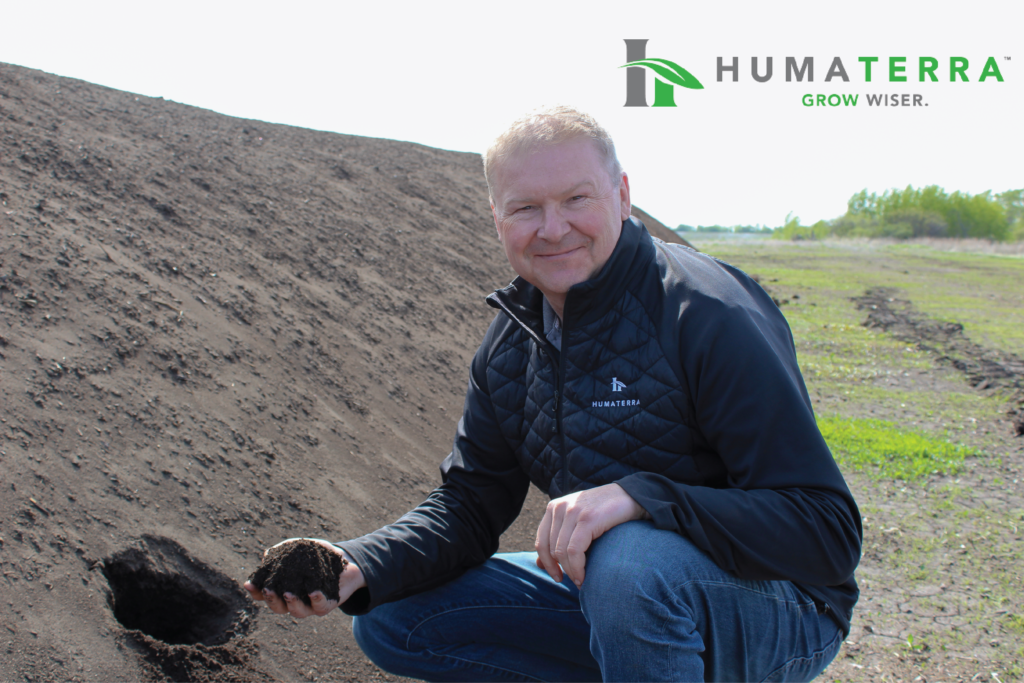Watch the HumaTerra: Ag-West Bio member profile
Soil is not just a medium in which to grow plants. It’s a living ecosystem, and the health of that ecosystem will ultimately dictate how successfully plants can grow.
Since 2016, HumaTerra has been on a mission to improve soil health by increasing the diversity, density, and resilience of soil microbes in agricultural and reclaimed land. More recently, they’ve also expanded into the horticulture market.
“Our founder, Koenraad Duhem, understood that soil health is driven by biology, and if you can grow healthy plants, you have healthier humans and animals that are eating those plants,” says Leon Pratchler, CEO of HumaTerra.
He explains that, while the success of most agricultural efforts ultimately depends on the health of the soil, the role of soil biology is becoming part of that conversation at a commercial level. “When we talk to farmers or horticulturalists, the first thing they are concerned about is fertility, because that’s what everybody knows. How do we add fertilizer? How do we control the weeds? How do we put in the best seed genetics? When you start talking about the potential of biology and soil amendments to increase the productive capacity, it’s a new concept and conversation.”
Farmers are good stewards of the land, he says, and they don’t want to use more inputs than they need. “People would like to reduce costs, reduce the volume of product they’re putting on, and continue to grow more crop. When we show producers that we can provide better crop health, better soil health, and the potential to reduce the use of inputs, there’s definitely interest in that.”
HumaTerra produces a compost pellet called H-Start that’s customized for different applications in agriculture, land reclamation, and horticulture.
For agricultural applications, they make H-Start Brassica Blend for canola and H-Start Broadacre Blend for everything else. “They are similar, but with a slightly different ratio of ingredients,” explains Pratchler. “We sell them through independent retailers, some selected Co-ops, and directly to farms if they don’t have access to a retailer who sells it in their area.”
They also have H-Start Reclaim for highly disturbed areas, such as pipelines, abandoned mine sites, or commercial construction sites. “Reclamation is similar to agriculture, but typically the soil conditions are far worse. We’re just entering that market, but initial testing has been very positive.”
They expanded into the horticultural space last year with H-Start Yard & Garden. Pratchler explains that typical potting mediums are sterile substrates and H-Start adds life into them.
“A few local greenhouses have done trials with our product and have had absolutely incredible results,” he says. “I think people are starting to realize that what they’ve always done can be enhanced when they start to think of it through the lens of biology and soil health.”
HumaTerra creates the core of its H-Start products from materials such as organics and compostable materials that would otherwise be considered waste. Most inputs come from Saskatchewan. The compost is processed at its facility in Birch Hills, SK, to develop a natural microbial profile prior to producing the H-Start products.
With the growing awareness around soil biology, there are also an increasing number of companies in the biologicals space. What sets HumaTerra apart, says Pratchler, is its focus on ease of use, flexible application options, longer shelf life, and ease of storage.
“We have a dry granulated pellet that has a long shelf life. It has a high fungus-to-bacteria ratio, which is important for soil health, and it can be blended with fertilizer or put down beside the seed on its own.”
Although HumaTerra is enjoying the results its products have been achieving, he says the company is still in its infancy and they’re excited about all the things they still have to learn. “The understanding of the biological process below ground has been studied for decades, but we still don’t know that much about it. There’s way more to learn and we’re part of this educational journey.”
It helps to have some of the best agronomists and scientists in the world right here. Pratchler says many of those connections were made through Ag-West Bio. “Without Ag-West Bio, we wouldn’t have met quite a few of the companies and individuals we are working with today. There are a lot of smart people in Saskatchewan, and I think we’ve found a lot of them.”
Top Photo: Leon Pratchler, CEO of HumaTerra
Thank you to HumaTerra Regen Ag for the photo.
Video production by Aspen Films
This article first appeared in Ag-West Bio’s 2024 Annual Report.
Michelle Boulton is a Saskatoon-based freelance writer.
Previous Article – Register for the Saskatchewan Crops Forum
Next Article – Joe Kleinsasser Awarded Farm & Food Care Champion for 2024
